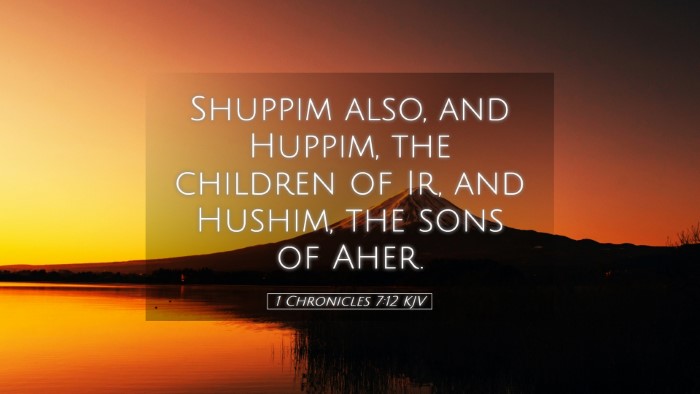Commentary on 1 Chronicles 7:12
The verse 1 Chronicles 7:12 reads: "The sons of Ephraim: Shuthelah and his son Bered, and Tahath his son, and Eleadah his son, and Tahath his son." This verse is part of the genealogical records in the Chronicles, which serve to affirm the genealogy and inheritance promises made to the tribes of Israel.
Context and Significance
The genealogies found in the Book of Chronicles emphasize the importance of lineage in Israel's history. As pastoral leaders and theologians examine these genealogical records, they uncover how the historical narratives provide a foundation for understanding God's covenant with His people. The family line of Ephraim, one of the tribes of Joseph, signifies not only the fulfillment of God's promises but also the central role of Ephraim in the history of Israel.
Insights from Public Domain Commentaries
Matthew Henry's Commentary
Matthew Henry highlights the importance of these genealogical listings, stating that they serve as “an evidence of God’s mercy to his people.” He emphasizes that while genealogies may seem tedious, they remind us of the covenant faithfulness of God. In this instance, the sons of Ephraim are mentioned, and Henry notes that the inclusion of specific names illustrates the heritage of Christ as coming from the line of Judah but also acknowledges the significant role of Ephraim in the history of Israel.
Albert Barnes' Notes on the Bible
Albert Barnes provides a detailed examination of the names mentioned in 1 Chronicles 7:12. He explains that Shuthelah is viewed as a prominent descendant of Ephraim, reflecting on the responsibilities that come with such ancestry. Barnes stresses the significance of Bered, who is associated with “‘the wandering,’” suggesting a time of transition or difficulty in Ephraim's lineage. This points to a larger narrative of how the Israelites, even amidst trials, retained their identity through genealogical continuity.
Adam Clarke's Commentary
Adam Clarke adds further insight by connecting the names listed in this verse to historical events surrounding the tribes’ activities. He suggests that the mention of these names indicates a strategic importance of Ephraim in military and leadership roles during the conquest of the Promised Land. Clarke points out that each name carries the weight of personal stories, struggles, and the perseverance of faith which contribute to the broader history of Israel.
Theological Reflections
The genealogical passages in Chronicles, especially verses like 1 Chronicles 7:12, remind us that God values the stories of individuals and families within the larger tapestry of His plan. For pastors, this calls for an emphasis on the importance of heritage in teaching. For students and scholars, it provides a rich field for exploration of the way God works through families in historical contexts.
Moreover, these verses foster discussions on the concept of identity in Christ. As the descendants of Ephraim were positioned within God’s redemptive plan, believers today are grafted into this story. The links between generations underscore our collective journey and individual callings in God’s Kingdom.
Lessons for Today's Believers
-
Recognition of Heritage:
Understanding our spiritual and familial heritage is essential for laying a foundational faith. Just as the tribes were acknowledged for their lineages, so too we must recognize the importance of our spiritual ancestors that shape our beliefs and practices today.
-
God’s Continuity in History:
The detailed account of lineage serves to remind us of God’s faithfulness through the ages. As we reflect on the names listed, we can draw parallels to our spiritual journey, recognizing that God is faithful through trials and triumphs.
-
The Value of Community:
The genealogical records emphasize the importance of community and collective identity. In church settings, fostering a sense of belonging and recognition of each other’s stories can lead to more profound connections and sustenance of faith practices.
Conclusion
In conclusion, 1 Chronicles 7:12 is more than just a listing of names; it is a testament to God’s enduring promise to His people. By drawing from esteemed commentaries, we gain insight into the significance of these genealogical accounts. For all who engage with this passage—pastors, students, theologians, and scholars—the message is clear: our pasts, both spiritual and communal, shape our identities, and in understanding them, we better appreciate God’s overarching narrative of redemption and grace.


